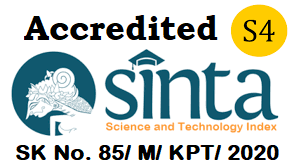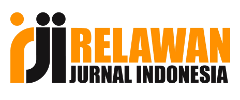Analysis of the Kaizen 5S Implementation on Work Effectiveness Using Multiple Linear Regression Test
Abstract
Standardization of 5S (Seiri, Seiton, Seiso, Seiketsu and Shitsuke) and waste elimination (Muda) are the 3 main pillars of gemba Kaizen in improvement with a common sense and low cost approach. Dirty and unkempt machines, dirty work environment are some of the problems faced by PT. XYZ. All of this causes a waste of both cost and time. Poor workplace management can also lead to waste. Discipline and morale of the workers are also one of the problems that exist in PT. XYZ. Lack of awareness and discipline of employees can be seen in the ongoing production activities. This study uses a case study method which is part of an interactive qualitative research method that applies the 5S concept in solving problems and uses a linear regression test which aims to determine the significant effect of the simultaneous and dominant 5S Kaizen concept on the work effectiveness of PT. XYZ. The results showed that the concept of Kaizen 5S simultaneously had a significant effect on work effectiveness. While the variables that have the most dominant influence on work effectiveness.
References
Hartini, A., 2012. Peranan Budaya Kerja dalam meningkatkan Efektivitas Kerja Karyawan: Studi Penerapan Budaya Kerja Jepang 5S (Seiri, Seiton, Seiso, Seikatsu, Shitsuke) Pada PT Santo Jaya Components Indonesia, Skripsi, S1 Manajemen, Universitas Sangga Buana YPKP, Bandung.
Imai, M., 1999. Gamba Kaizen Pendekatan Akal Sehat Berbiaya Rendah. Jakarta: CV Taruna Grafica.
Kusumaningrum, D. & Muhtadin, 2018. Pengaruh Budaya Kaizen Terhadap Kinerja Karyawan PT. Indospring, Tbk di
Gresik. Jurnal Fakultas Ekonomi: Gema Ekonomi, 6(2), pp. 185-201. http://journal.unigres.ac.id/index.php/.
Laswitarni, N. K. & Lestari, C. N., 2019. Analisis Budaya Kerja 5S (Seiri, Seiton, Seiso, Seikatsu, Shitsuke) Terhadap Peningkatan Efektivitas Pelayanan (Studi Kasus Pada PT Bank Central Asia Cabang Gianyar dan Klungkung), Prosiding Seminar Nasional Hasil Penelitian, Denpasar, Mei 24.
Monden, Y., 2000. Sistem Produksi Toyota: Suatu Ancangan Terpadu Untuk Penerapan Just In time. Jakarta: PPM.
Osada, T., 2002. Sikap Kerja 5S. Bandung: Victory Jaya Abadi.
Yudhanto, A. D. & Purwanto, 2020. Analisa Pengaruh Penerapan Budaya 5S Terhadap Produktivitas Karyawan di PT Samsung Electronics Indonesia, Bekasi. Jurnal Muara Ilmu Ekonomi dan Bisnis, 4(2), pp. 205-215. doi:https://doi.org/10.24912/jmieb.v4i2.7609.

This work is licensed under a Creative Commons Attribution-NonCommercial-ShareAlike 4.0 International License.













